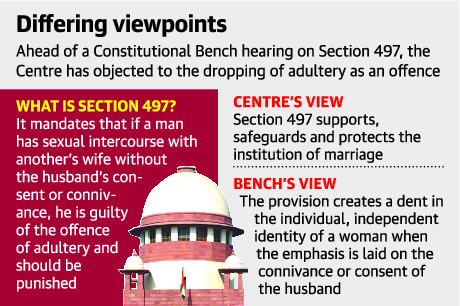Meaning of Adultery: voluntary sexual intercourse between a married person and a person who is not their spouse.
Petition:
- Drop adultery as a criminal offence from the statute book.
- The petition challenges the validity of Section 198 (1) and (2) of the Code of Criminal Procedure which deems that only a husband can be an aggrieved party in offences against marriage like adultery and only he can go to court.
Supreme Court observations:
- The dusty Victorian provision of adultery in the Indian Penal Code treats a married woman as her husband’s “subordinate.”
- Time has come when the society must realise that a woman is equal to a man in every respect.
Section 497:
- Section 497 of the IPC mandates that “Whoever has sexual intercourse with a person who is and whom he knows or has reason to believe to be the wife of another man, without the consent or connivance of that man, such sexual intercourse not amounting the offence of rape, is guilty of the offence of adultery and shall be punished.”
- Section 497 is a kind of “romantic paternalism,” which stemmed from the assumption that women, like chattels, are the property of men.
- Section 497 gave husbands the exclusive right as an aggrieved party to prosecute the adulterer in a case involving his wife, a similar right has not been conferred on a wife to prosecute the woman with whom her husband has committed adultery.
Wife has no right to prosecute her husband:
- The provision does not confer any right on the wife to prosecute her husband for adultery. The law also does not take into account cases where the husband has sexual relations with an unmarried woman. Thus, the provision deems that “husbands have a free licence under the law to have extra-marital relationships with unmarried women.”
Court to examine two provisions:
- Why does Section 497 treat the man as the adulterer and the married woman as a victim.
- The offence of adultery ceases the moment it is established that the husband connived or consented to the adulterous act. So, is a married woman the “property” of her husband or a passive object without a mind of her own?
Government’s stand
- Centre said the provision punishing adultery – Section 497 of IPC – supports, safeguards and protects the institution of marriage considering the unique structure and culture of Indian society.
- The government agreed to the thought that stability of a marriage is not an ideal to be scorned and striking down Section 497 would destroy the fabric of society itself.
Key facts:
- The apex court had earlier on three separate occasions, in 1954, 1985 and 1988, upheld the constitutionality of Section 497.


SC Final Verdict:
- The law became defunct on 27 Sep 2018 by Supreme Court of India.
- The Supreme Court called the law unconstitutional because it “treats a husband as the master.”
- Bench held adultery is not a crime and struck it off the Indian Penal Code.
- Two individuals may part if one cheats, but to attach criminality to infidelity is going too far.
- How married couples deal with adultery is absolutely a matter of privacy.
- Punishing each other or the wife’s lover is unlikely to re-kindle commitment.
Source: